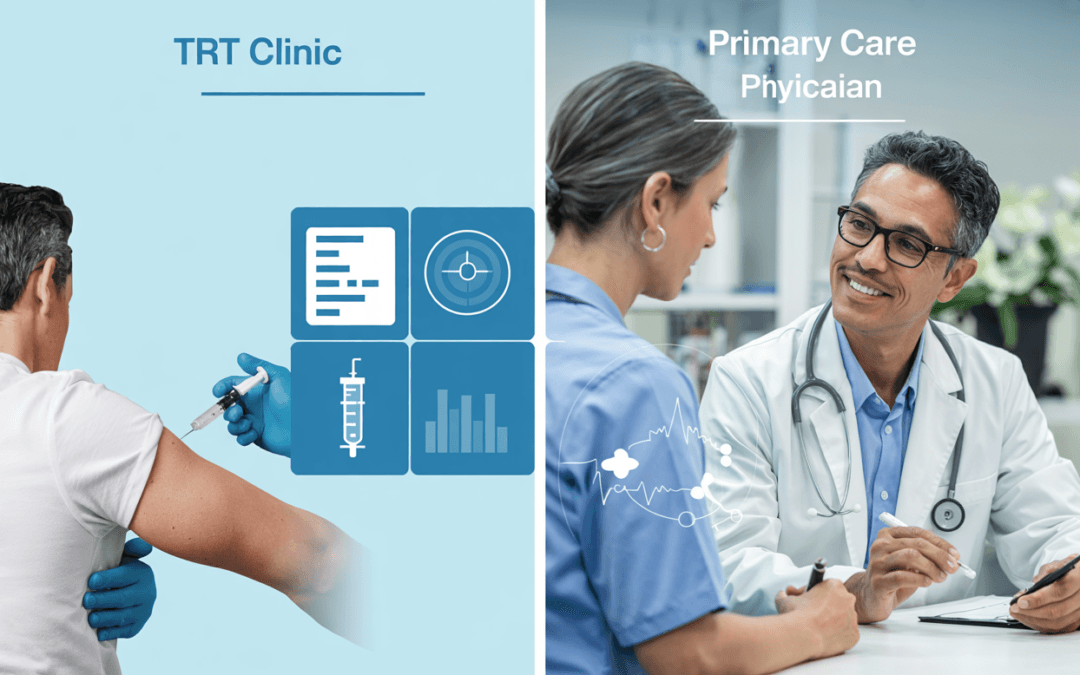If you’re a man experiencing fatigue, low libido, weight gain, or mood changes, you may be wondering if low testosterone (Low T) is to blame. Testosterone Replacement Therapy (TRT) has become increasingly popular in recent years, with countless “TRT clinics” offering fast-track treatment plans. But is that the best path for your health? At Health Express Clinics, your trusted primary care provider in Lewisville, Texas, we believe in a more comprehensive approach.
In this article, we’ll compare TRT clinics vs. regular doctors, answer the top questions people ask online about testosterone treatment, and explain why getting TRT under the guidance of your primary care physician (PCP) is often the smarter and safer choice.
What Is Low Testosterone (Low T)?
Low testosterone, or hypogonadism, occurs when the body does not produce enough of the hormone testosterone. This hormone plays a crucial role in maintaining energy levels, muscle mass, sex drive, mood, and overall vitality.
Common Symptoms of Low T
- Chronic fatigue or low energy
- Decreased libido or erectile dysfunction
- Loss of muscle mass or increased fat
- Mood swings or depression
- Poor concentration or memory
- Trouble sleeping
Low testosterone can result from aging, medications, medical conditions, obesity, or lifestyle factors like stress and poor diet.
What Is TRT (Testosterone Replacement Therapy)?
Testosterone Replacement Therapy (TRT) is a medical treatment designed to increase testosterone levels in men with clinically low levels. It’s available in various forms:
- 💉 Injections (most common)
- 💊 Oral capsules
- 🩹 Patches
- 💧 Topical gels
- 🔘 Pellets inserted under the skin
TRT can significantly improve a man’s energy, mood, and sexual health—but it’s not risk-free. Side effects can include acne, breast enlargement, fertility reduction, elevated red blood cells, and increased risk of cardiovascular issues if not carefully monitored.
What Are TRT Clinics and How Do They Work?
TRT clinics are specialized centers focused exclusively on hormone optimization and testosterone therapy. Many of them advertise convenience and rapid results.
Typical Characteristics of TRT Clinics
- Focus solely on hormone levels
- Fast lab testing and “instant” consultations
- Little evaluation of underlying health conditions
- Often bypass traditional insurance (cash-based)
- Use of generalized treatment plans
While some offer excellent care, others may not fully assess your long-term risks or medical history, and may encourage TRT for patients who may not need it.
Role of a Primary Care Physician (PCP) in Treating Low T
Primary care physicians are trained to treat the whole person, not just one hormone imbalance.
Here’s how PCPs approach Low T:
- Evaluate full medical history and lifestyle
- Conduct comprehensive lab panels, not just testosterone
- Rule out reversible causes (e.g., sleep apnea, thyroid issues)
- Tailor TRT plans to long-term health goals
- Provide close follow-up, monitoring, and patient education
Instead of just replacing testosterone, a PCP focuses on why levels are low—and whether treating the root cause can help.
TRT Clinics vs. Regular Doctors: A Comparison
| Feature | TRT Clinics | Primary Care Physicians (PCPs) |
| Scope | Hormone-focused | Whole-person wellness |
| Evaluation | Basic hormone panels | Full health assessment |
| Monitoring | May be infrequent | Scheduled, evidence-based follow-up |
| Treatment Plans | Often generalized | Personalized & based on guidelines |
| Insurance | Rarely accepted | Usually accepted |
| Continuity of Care | No long-term relationship | Yes – with overall health tracking |
Benefits of Getting TRT from Your PCP
- ✅ Holistic Viewpoint: Addresses the why behind low T
- ✅ Integrated Care: Handles all your health concerns, not just testosterone
- ✅ Co-morbidity Management: Helps with related issues like weight, sleep, and cholesterol
- ✅ Better Safety Monitoring: Prevents side effects and ensures safe dosing
- ✅ Insurance-Friendly: Often covered under your health plan
- ✅ Trust-Based Relationship: More than just labs—your PCP knows you
Top 5 Questions About TRT (and the Real Answers)
1. Is TRT safe long-term?
Yes—when properly monitored. A PCP tracks PSA, red blood cell count, and cardiovascular risk, keeping your safety first.
2. Can I just go to a TRT clinic if I feel tired?
Fatigue can stem from many causes. You need a full evaluation before assuming it’s Low T. Your PCP can rule out sleep apnea, thyroid disorders, or mental health issues.
3. How soon does TRT start working?
Some men report better energy and libido within 3–6 weeks. Muscle mass and mood changes take 2–3 months. A PCP will help set expectations.
4. Does TRT affect fertility?
Yes. TRT can reduce sperm count. Men trying to conceive should discuss alternative treatments with their doctor.
5. Do I have to stay on TRT forever?
Not always. If your low T is reversible (e.g., obesity, poor sleep), you may be able to wean off with your doctor’s guidance.
Why Choose Health Express Clinics in Lewisville for Low T Treatment?
At Health Express Clinics, we deliver more than a prescription—we deliver peace of mind and continuity of care.
Here’s what sets us apart:
- 🩺 Experienced family physician who treats hormone health holistically
- 📊 Comprehensive diagnostic testing including other vital health markers
- 💬 One-on-one counseling for safe and informed treatment
- 💼 Insurance accepted for cost-effective care
- 🧠 Whole-person wellness model, not a hormone-only plan
Final Thoughts: Holistic Health > Hormone Hype
Low testosterone is a legitimate health concern—but treatment should never be based solely on one hormone level. TRT clinics may offer a shortcut, but they don’t offer comprehensive care.
A primary care provider like those at Health Express Clinics in Lewisville, TX considers your full picture—your lifestyle, medical history, family risk factors, and overall goals.
⚠️ Don’t chase quick fixes. Choose sustainable solutions.
Let your trusted PCP help you make the best decision for your long-term health.

